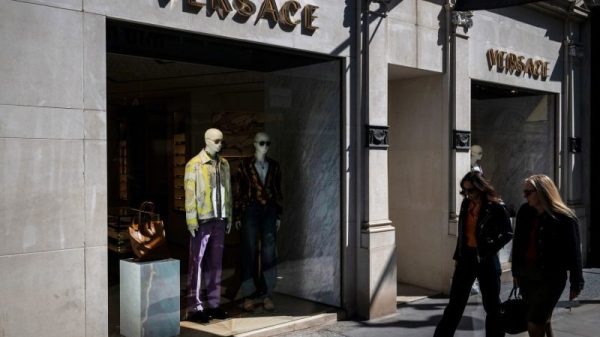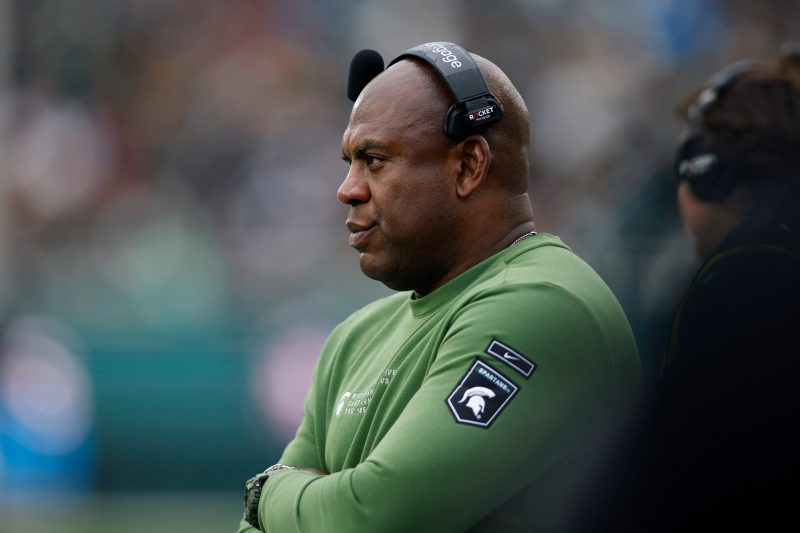The long-running campus sexual harassment investigation of former Michigan State University head football coach Mel Tucker is officially over.
An outside attorney hired by the school to review Tucker’s challenge to the findings of fault against him denied his appeal in a 24-page report issued Thursday, ending the process nearly 13 months after the complaint was filed by a rape survivor and anti-sexual violence activist.
“Based on the facts outlined in the record, the (Resolution Officer) had a reasonable basis for each of the challenged findings,” wrote Courtney Bullard, a Tennessee-based attorney and founder of consulting firm Institutional Compliance Solutions. “The RO’s Decision is upheld. This decision is final.”
Tucker, who had been one of the highest-paid coaches in any sport before being fired in September, was formally disciplined for sexually harassing and exploiting Brenda Tracy, who he had hired to educate his team about sexual violence – an outcome that lessens his odds of ever coaching football again.
University leaders will now determine any sanctions to issue Tucker. Although he is no longer an employee, they can still ban him from campus, future employment at MSU or participation in school activities, such as attending football games.
Tracy, through her attorney, Karen Truszkowski, said she was “grateful that this long and challenging process has concluded.” Tucker and his attorney, Jennifer Belveal, could not immediately be reached for comment. However, Tucker has accused the school of conducting a sham investigation designed to end his contract and has indicated he plans to sue Michigan State for wrongful termination.
In an emailed statement, University spokesperson Emily Guerrant underscored that the action “confirms a violation of the university’s Relationship Violence and Sexual Misconduct and Title IX Policy.”
“The university is continuing its commitment to fostering a culture of safety within our community,” Guerrant said. “That commitment includes supporting those who have experienced relationship violence or sexual misconduct, safeguarding privacy, and ensuring a fair process.”
Tucker was found on Oct. 25 to have violated the school’s sexual misconduct policy, following a hearing three weeks before that neither he nor Belveal attended. The hearing officer concluded Tucker sexually harassed and exploited Tracy when he masturbated and made sexual comments without her consent during an April 2022 phone call; made unwanted sexual advances toward Tracy in the eight months before the call; and engaged in quid pro quo sexual harassment after, when he ended their business relationship.
Michigan State fired Tucker for cause – canceling the roughly $80 million remaining on his 10-year contract – on Sept. 26, just over two weeks after Tracy went public with her allegations in a USA TODAY investigation. Even Tucker’s version of events – that he and Tracy had been in a romantic relationship and had consensual phone sex – constituted a fireable offense, wrote athletic director Alan Haller in a letter informing Tucker of his intent to fire him.
“It is decidedly unprofessional and unethical to flirt, make sexual comments, and masturbate while on the phone with a University vendor,” Haller’s letter said. “The unprofessional and unethical behavior is particularly egregious given that the Vendor at issue was contracted by the University for the sole purpose of educating student-athletes on, and preventing instances of, inappropriate sexual misconduct.”
Denied appeal claimed new evidence had emerged
Tucker’s 54-page appeal, written by Belveal, reiterated arguments they made throughout the case, including that the school lacks jurisdiction to investigate his private life and that the investigator was biased against him – and men more broadly.
Tucker and Belveal also claimed to have obtained new evidence that would have materially affected the outcome: text messages between Tracy and her best friend and booking assistant Ahlan Alavardo, who died in a June car crash, and an affidavit from Alvarado’s cousin, Jennifer Ruiz, who claimed Tracy manipulated Alvarado.
The appeal contained 154 pages of exhibits, including redacted copies of the messages and the affidavit, which they said proved Tracy falsely accused Tucker in a plot for money.
The text messages and affidavit were not provided to the Title IX office in a timely manner, Bullard determined, and therefore could not be considered when the determination was made. Instead of submitting the texts as potential new evidence upon receiving them in September from Alvarado’s husband – which would have given Tracy a chance to respond to them – and offering Ruiz as a potential new witness, Tucker and Belveal withheld the information for several weeks before providing it to the university’s Board of Trustees and the media while the hearing was in progress.
They then submitted copies of some of the texts to the Title IX office on Oct. 20, emails show – two weeks after the hearing.
Even if the texts and affidavit had been submitted on time, they would not have swayed the outcome, Bullard wrote. An affidavit from a third-party witness who never spoke to the investigator “is not as compelling as the witness providing her information during the hearing and being subjected to cross-examination,” Bullard wrote. The text messages most pertinent to the case, she added, were those between Tracy and Tucker, which both acknowledged deleting.
Alvarado’s statements to the investigator months before her death also contradict Ruiz’s assertions and support Tracy’s version of events.
Bullard found no evidence of any bias on the part of the outside investigator, Rebecca Veidlinger, or the outside hearing officer, Amanda Norris Ames, who had determined Tucker’s account was less plausible, less consistent and less supported by the evidence than Tracy’s.
In a written response to the appeal, Tracy and her attorney wrote: “The claimant points out that throughout this process, and in the respondent’s appeal, in addition to referring to the claimant as a ‘liar,’ the respondent repeatedly accuses multiple parties of unethical and biased behavior including the investigator, MSU general counsel, claimant’s advisor, OIE personnel, the resolution officer (RO), and the MSU athletic director. Respondent’s appeal rests on these allegations with no factual or legal support. It is simply implausible that every party involved in this matter is untruthful, unethical, biased, or any combination thereof.”
Investigators defended their work on the case – and their conclusions
Both Veidlinger and Ames defended their handling of the case in separate letters to Bullard. Ames wrote that while Tucker may disagree with her conclusions, “his disagreement does not negate the reasonable basis in fact articulated for each factual finding.”
Veidlinger’s response, which contained 26 pages of exhibits, was particularly forceful, describing Tucker’s appeal as “laced with false representations and invective” and Belveal’s tactics throughout the case as abusive.
For instance, Belveal accused Veidlinger of compromising the integrity of the investigation by having an inappropriate, ‘ex parte meeting’ with Tracy’s adviser, Karen Truszkowski, in June, while the investigation was ongoing. Veidlinger noted the hypocrisy of such a claim, given that she and Belveal had met multiple times throughout the case at Belveal’s request.
“As anyone who has ever been involved in a single sexual misconduct investigation knows, investigators meet all the time with parties/advisors without the other party/advisor present, such as during interviews, when a party/advisor wishes to ask questions about the process, to collect clarifying information about evidence submitted, etc.,” Veidlinger wrote.
Additionally, Belveal accused Veidlinger of making up allegations that Tracy never made – including that Tucker threatened Tracy – “to try to justify her work as an investigator.” Belveal also said that Veidlinger never informed Tucker that he was being investigated for quid pro quo sexual harassment, in violation of his due process rights.
Veidlinger pointed to the exact page in the investigation report where Tracy had said she felt “really intimidated, threatened and scared” when she said Tucker implied he would destroy her career if she spoke out about him. She also noted that Tucker was notified he was being investigated for quid pro quo sexual harassment and creating a hostile environment on Dec. 22, 2022 – one day after Tracy filed her formal complaint.
Belveal also alleged that Veidlinger asked Tracy to do a follow-up interview but did not afford the same chance to Tucker. Veidlinger pointed out that she did, in fact, offer to meet with Tucker a second time on April 3 and sent him written follow-up questions to answer, but Tucker declined the opportunity.
“Ms. Belveal alleges that I – along with every other person who touched this case (and several who did not) – made myriad errors and/or were superbly biased against Respondent,” Veidlinger wrote in her response.
“As you’ll see,” she continued, “none of it is true.”
Kenny Jacoby is an investigative reporter for USA TODAY covering sexual harassment and violence and Title IX. Contact him by email at kjacoby@usatoday.com or follow him on X @kennyjacoby.



























